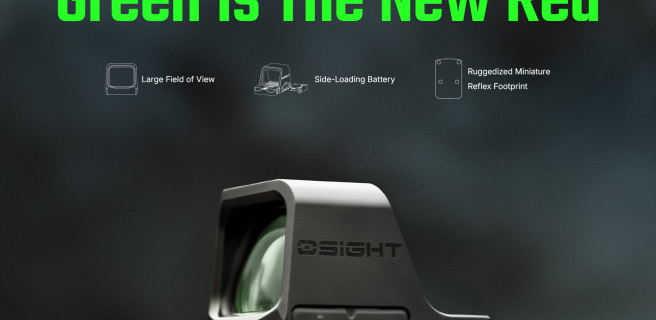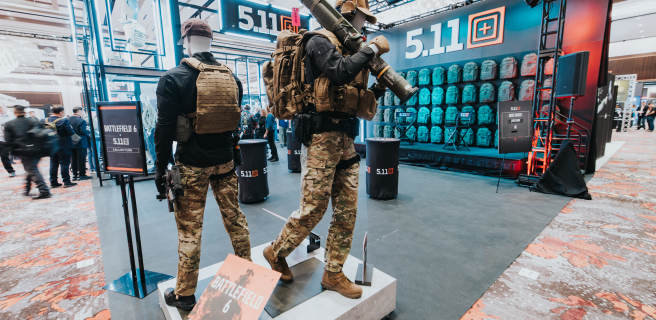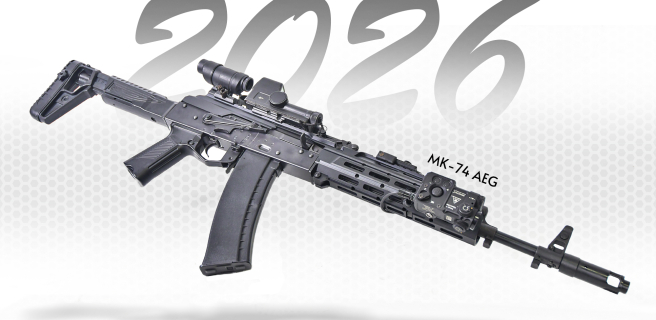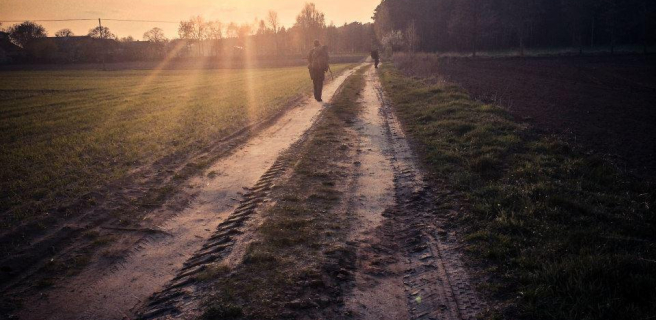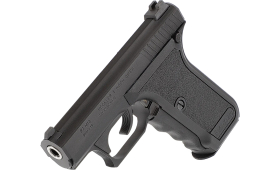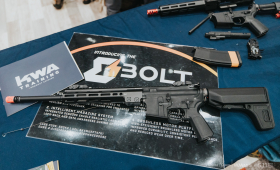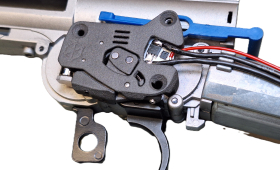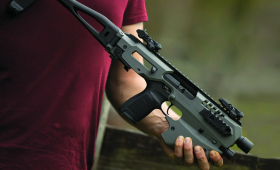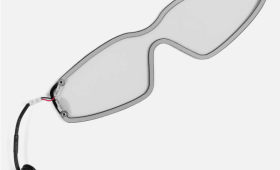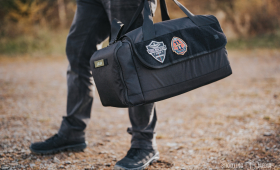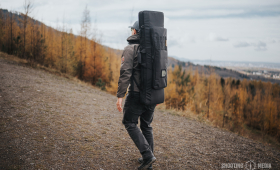It is true that over time, it turned out that the stories about the local splendours, told during social gatherings somewhere in the dark recesses of Polish residential districts, were somewhat exaggerated. You can still meet compatriots who, after returning from short stays behind the Oder, will be enraptured by the incredible wonders they have allegedly seen there, but their stories no longer find such a gullible audience as they once did and they face a barrier of healthy skepticism.
Well, taking into consideration certain issues, we are light years behind the West, but the gap divided us some 15 years ago has narrowed a bit after all (it could be even said that made a step forward while standing on the edge of this gap). What's more, there are certain areas of our lives that we do not have to be ashamed of, but other "better" countries can, in stead, envy us. One of the reasons are the laws and regulation regarding airsoft.

In legal terms, Poland is the airsoft El Dorado. Even the most realistic replicas looking have almost the same status as water guns. As long as your replica fires BBs with an energy lesser than 17J (or about 1350 FPS) and you do not walk around in publicly with it, without notifying the appropriate authorities, all is well. No additional purchase permits are required. Formally, you do not even have to be 18 or older. As a result, the market develops without restrictions, and the environment is as dynamic as it is rarely in the world.
Meanwhile, reading about the situation of airsoft in Great Britain for example, can be quite astonishing. Apart from legal acts, there are also a number of initiatives by the community itself regarding self-imposed restrictions, which can ruin the perfect picture of reality.
In the interests of the highest well being of the citizens ...
An old saying goes that the government wants our well being and that's why we must conceal this well being effectively. It does not look different on the British Isles. In the context of airsoft, it was once again a place of a heated debate in May this year, when further restrictions were introduced.
Not so long ago, the situation in the UK was as simple as the road to perdition and presented itself similarly to ours. Around 2006, when working on a new legal act, the royal officials decided to "look closely at the subject" and stated that to ensure the happiness and prosperity of the citizens of the former empire, a little more regulation regarding not just firearms, but also objects imitating them in real life, is needed.

This was connected with the fact that after the introduction of a series of laws over the years that imposed additional restrictions on trade and possession of firearms, it was noted that many crimes were committed using realistic replicas, such as airsoft toys and other types pf dummies. Not seeing any other way to solve the problem, it was decided to do what many officials know best, prohibit something as a precautionary measure.
To make matters clear, the history of introducing restrictions on firearms in the UK is centuries-old. In the twentieth century, being the period that interests us the most, the introduction of restrictions was initially dictated by fears about social unrest caused by activities of the working class and the the IRA. It is not difficult to guess that with revolutionary calls in the country, where one of the most popular professions was being a disappointed veteran of the Great War without means to live and a permanent occupation, some regulations were needed.

Well, the working class, softened by appropriate social privileges, gave up on the idea of an armed struggle and ceased to be susceptible to flamboyant speeches of party agitators. The IRA, a strange case, soon after the collapse of the USSR also calmed down a little, but the restrictions remained. In the meantime, the legislator decided to impose new ones. Look on Wikipedia for details.
Currently, issues related to access to firearms are regulated by the Firearms Act 1968 with subsequent amendments in 1988 and 1997, caused by the massacres in Hungerford (1986) and Dunblane (1996). In both cases, the perpetrator's weapon was legally owned. Without going into details, the amount of firearms in private hands has been limited very much as a result of the introduction of these regulation. In practice, this means that the Polish UoBiA (ang. Act on Weapons and Ammunition) together with accompanying acts grants our citizens much more freedom.
As for the airsoft, the Violent Crime Reduction Act 2006 (hereinafter referred to as VCRA 2006), with later changes, has stirred up a lot in the British airsoft community. Its restrictions were not strictly aimed at airsoft (the act itself is much more comprehensive and touches upon other aspects related to violence) and local players have been hit hard, but regardless of its intentions, in the first version of the Act airsoft was to be effectively banned. Suffice it to say that even a rummer weapon replica could have been included in the "forbidden" category.

A distinction has been made between Imitation Firearms - IF and Realistic Imitation Firearms - RIF. In the light of these regulations, the RIFs have been almost excluded from trade. Only museums, art galleries, film, TV and theater producers, historical reenactors and servants of the royal family could purchase them if it was connected with their duties.
The rest of the adult society had to remain contented with replicas of dimensions not exceeding 38 mm in height and 70 mm in length or made, to a large extent, from transparent bright red, bright orange, bright green, bright blue, bright yellow or bright purple (the proportions between the bright and subdued colours are not clearly defined, but most source available state that the coloration of at least 50% of the surface of a replica in bright colours is sufficient).
Such a case resulted in understandable dissatisfaction among British entrepreneurs related in some way to the industry. In the end, by a simple oversight, the authorities wanted to finish their business.
An agreement above the divisions
Concerned businessmen presented their democratic maturity and quickly establishing an association called UKARA (United Kingdom Airsoft Retailers Association) and entered into talks with the government. After long negotiations, a amendment was added to the VCRA 2006, allowing the acquisition of RIF by participants of airsoft (skirmishers) games taking place on appropriately insured commercial fields. From October 2007, the situation has been stabilized for a time.
The legislator, in his inexhaustible wisdom, did not specify how the definition of an airsoft player. He also did not specify how to verify whether a potential buyer is indeed an active airsoft player, leaving it up to the parties of the transaction. At the same time, he solemnly assured the sellers (regardless of whether it is an enterprise or a private person) that they will be held liable if the negligently verified buyer commits a crime.

Because of such a turn of events, the UKARA decided on a scheme somewhat similar to our licensing system in sport shooting. To buy your first "adult" replica, not a painted one, you must become a member of one of the commercial airsoft fields. Then, within a period longer then 56 days, you must participate in at least 3 matches (e.g. the first game on day 1, the third on day 57). After this time, you can get the UKARA license free of charge, thanks to which you can finally buy a replica you want.
Over the years, several organizations emerged, that are a complement or an alternative to the UKARA - the United Kingdom Players Union (UKAPU) and the British Airsoft Club (BAC). Despite this the UKARA is still the leading one, however, after visiting its website one can have serious doubts about it.
The UKARA has certain clear requirements to which players, fields and shops must comply, and monitors the legal situation, along with other organizations lobbying in the interest of the industry. In the end, to be or not to be of airsoft in the UK depends entirely on the whim of the government.
Further regulations come into force
By 2017, all issues regarding the power of the replicas we dealt with on the basis of a gentlemen's agreement between representatives of the airsoft community in the UK and the Home Office. Technically, most fields had a top limit of 350 FPS for replicas with the option of full-auto fire and 500 FPS for replicas with only a single fire setting. There were also fields where the restrictions were set as low as 300 FPS.
In May 2017 the Policing and Crime Act 2017 came into force. The problem was that in the original version this act was so restrictive that trade in airsoft replicas fell under the firearms trade rules meaning they would need a properly protected warehouse for their storage, BBs would be treated the same as ammunition for firearms, etc. This would apply to all toys and airguns with a power above 1J. Possession of such would be possible only on the basis of a permit. Officially, these changes were motivated by the ease of increasing the muzzle velocity of replicas and converting them into pneumatic weapons.

It is not entirely clear how the negotiations looked like, but they allegedly required the coordination of many organizations associating people taking part in our hobby in order to push through the amendment taking airsoft replicas out from the "requiring a permit" category. Ultimately, however, the British government eased up its stance and unambiguously stated that airsoft toys are not weapons, therefore they do not fall under the Firearms Act 1968.
Currently, the bar power has been raised up a bit and official rules state the energy of 1.3J (370 FPS) for replicas with full-auto firing mode and 2.5J (520 FPS) for replicas with single firing mode only. It exceeds the limits of most sites, but for the foreseeable future, at least, it will be easier to negotiate any further restrictions with such a state of affairs.
Was it worth it?
It is difficult to answer this question in an unambiguous way. Apart from many obvious disadvantages of having every possible thing connected with airsoft in a legal framework (bureaucracy, waste of time, money, energy ...), you can see a few positives of the situation.
First of all, the inflow of accidental and irresponsible players was reduced by raising the "entry barrier". The need to buy a membership in a specific field somewhat reduces the anonymity of players in the environment (its easier to track and ostracize possible cheaters) especially that to buy a replica, even by a private person, it is necessary to belong to the UKARA or a similar organization.
Compulsory insurance of players is also not a problem when an unfortunate combination of circumstances will lead to an accident. It is better to play on a professionally prepared field, where you do not have to worry about holes and protruding reinforcing bars, or watch out for "non-combatants" strolling around the field which happens during games organized in public areas (such as forests in Poland, where everyone can enter).
The established top muzzle velocity limits eliminate the problem of the "arms race", which somewhat make the chances more even of players who do not want to invest too much money in their hobby. Although, in my opinion, this is a very debatable point, because according to one approach, investing in the performance of one's own replica is one way of achieving an advantage, on a par with fitness exercises and training tactics.

On the other hand, one should also consider whether the price for a certain order is not too high. As you can see, regulations that poison the lives of criminals once again hit honest citizens who want to pursue their passions in peace. It's hard to look for mil-sim games in the UK, for example, at least in our understanding of it. Watching videos and reading reports from local players, you get the impression that the games there have a very laid back character - little running, a lot of shooting, lunch breaks ... It's so good that the replicas do not have to have orange dummy muzzle breaks.
The UK airsoft community can just make a good face. Videos from game are dominated the arenas made for CQB engagements, where the high muzzle velocity is not even necessary anyway. On one there is even an abandoned shopping mall. The buildings seem to be in a relatively good condition. All are way beyond some of the commercial fields, which I had the opportunity to see in Poland.

Despite the fact that the fields look professional, it does not change the fact that one type of gameplay was legally enforced on the people. The drastic limitations of the muzzle velocity do not necessarily have to suit everyone.
It also shows a kind of lack of trust towards the citizens. Since we have already established that a "real" replica can be purchased only after meeting certain criteria, wherefore what speaks for additional restrictions directed towards the community? After all, it is the field owners who determine the top muzzle velocities as they deem appropriate and other rules valid on their property. In addition, the whole bottom-up system looked, at least in theory, as an efficiently organized one.
As you may have noticed during the reading, you can not judge the order according to your mentality in any way. The United Kingdom did not have such a turbulent history as Poland and hence a weapon in the social-cultural context is perceived in a completely different, more negative way. Making a long story short, for centuries the weapon was mainly used for hunting, shooting sports and committing crimes by outlaws and later by terrorists from the IRA. This translates into the number, condition and preferences of the local community.
Did it have any sense?
At the end I'll present an interesting fact. If you need a license to purchase an airsoft replica, you can get it simply as a gift without meeting any requirements.
Essentially the most important thing, that is the problem of crime in the UK it has not been resolved (but honestly - where has he been outside of Kalahari?). There are still violations of the law with the use of firearms, and as for the replicas, there are better alternatives for criminals. Anyway, to get around the law, you buy a colorful replica and a can of black paint in a DIY store.
It is true that recently there has been an increase in the number of incidents with the use of firearms and their replicas, consisting mainly of creating panic by publicly showing objects resembling weapons. On the other hand, in Nottingham for example, there was an 89% decline of such crimes, which makes an impression. In 2015, there were "barely" recorded 26 murders with the use of firearms in the whole of UK, numbering over 65 million people (in Poland within a similar time period - 19 with murders the use of firearms).
Coming back to DIY stores - there are full of cutting and blunt tools that can also be used for socially harmful activities. The same applies to the assortment of bicycle, car, decorating and furniture stores ... It is impossible to prohibit everything. And writing a law in reaction to actions of a few distorted units is leading nowhere. Using such criteria it's easy to fall into absurdities, and criminals will break the rules anyway (those British are especially fond of knives). The way will always be found and the law will be two steps behind.

Despite the fact that the airsoft market has already been tightly regulated, the local community can not sleep soundly and must monitor the situation on a current basis, defending itself against any legal initiatives. It is true that a healthy dose of "civilizing" a few issues would do us no harm even in Poland, but certainly not as tight as done on the Islands. As the legislators will start prohibit more and more things it is impossible to guess when they will stop. They will probably try to make us happy by force, therefore I prefer the current "anarchy" in terms of airsoft in Poland.
Although, I would appreciate a game in a shopping center. Maybe one will go out of business soon?
As always, we are curious about your thoughts.
I would like to thank Domin007 for substantive and cultural consultations.




